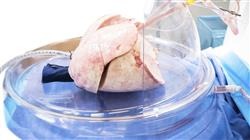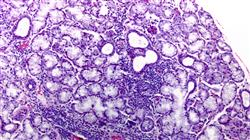University certificate
The world's largest faculty of medicine”
Introduction to the Program
With this program, the professional will be able to integrate the latest advances in Big Data applied to pulmonology into their daily work, while deepening their knowledge of techniques such as pulmonary nodule volumetry"

Pulmonology is one of the clinical disciplines that has experienced the greatest advances in recent years. Areas such as Big Data have led to the emergence of new techniques in this field, making it more accurate and effective. Therefore, the specialist has the opportunity to incorporate the latest procedures into their work thanks to this Advanced Master's Degree, which also integrates specialties such as genomic precision pulmonology.
Therefore, throughout this program, the physician will be able to delve into issues such as the genetics of susceptibility to lung cancer, the genetic links of COPD, pulmonary eosinophilias associated with asthma or hypoventilation syndromes. In addition, you will learn about the latest advances in procedures such as electromagnetic navigation or medical thoracoscopy. This will give you access to the most cutting-edge innovations in this complex but exciting field.
This Advanced Master's Degree is developed through a 100% online teaching method that has been specially designed with the working professional in mind, as it adapts to their personal circumstances, adjusting to their work pace and without imposing fixed schedules. In addition, its innovative contents will be presented in multimedia format, taught by a teaching staff of great prestige in this medical area.
TECH online methodology will allow you to combine your work with your studies, since it is completely adapted to you, without imposing fixed schedules”
This Advanced master’s degree in Clinical Pulmonology contains the most complete and up-to-date scientific program on the market. The most important features include:
- Practical cases presented by experts in medicine
- The graphic, schematic, and eminently practical contents with which they are created, provide scientific and practical information on the disciplines that are essential for professional practice
- Practical exercises where self-assessment can be used to improve learning
- Special emphasis is placed on innovative methodologies in the management of pneumologic pathologies
- Theoretical lessons, questions to the expert, debate forums on controversial topics, and individual reflection assignments
- Content that is accessible from any fixed or portable device with an Internet connection
TECH provides you with state-of-the-art educational technology: interactive summaries, case studies, video proceedings, master classes, etc. The most varied and effective resources to get you up to date"
The teaching staff includes professionals from the psychology sector, who bring their experience to this training program, as well as renowned specialists from leading societies and prestigious universities.
The multimedia content, developed with the latest educational technology, will provide the professional with situated and contextual learning, i.e., a simulated environment that will provide an immersive training experience designed to train for real-life situations.
This program is designed around Problem Based Learning, whereby the student must try to solve the different professional practice situations that arise during the academic year. For this purpose, the professional will be assisted by an innovative interactive video system created by renowned and experienced experts.
You will deepen you knowledge in the latest advances in the genetic links of COPD and in the surgical technique for lung transplants"

This Advanced Master's Degree will allow you to integrate the most recent innovations in pulmonology into your daily qoek in a quick and comfortable way"
Why study at TECH?
TECH is the world’s largest online university. With an impressive catalog of more than 14,000 university programs available in 11 languages, it is positioned as a leader in employability, with a 99% job placement rate. In addition, it relies on an enormous faculty of more than 6,000 professors of the highest international renown.

Study at the world's largest online university and guarantee your professional success. The future starts at TECH”
The world’s best online university according to FORBES
The prestigious Forbes magazine, specialized in business and finance, has highlighted TECH as “the world's best online university” This is what they have recently stated in an article in their digital edition in which they echo the success story of this institution, “thanks to the academic offer it provides, the selection of its teaching staff, and an innovative learning method aimed at educating the professionals of the future”
A revolutionary study method, a cutting-edge faculty and a practical focus: the key to TECH's success.
The most complete study plans on the university scene
TECH offers the most complete study plans on the university scene, with syllabuses that cover fundamental concepts and, at the same time, the main scientific advances in their specific scientific areas. In addition, these programs are continuously being updated to guarantee students the academic vanguard and the most in-demand professional skills. In this way, the university's qualifications provide its graduates with a significant advantage to propel their careers to success.
TECH offers the most comprehensive and intensive study plans on the current university scene.
A world-class teaching staff
TECH's teaching staff is made up of more than 6,000 professors with the highest international recognition. Professors, researchers and top executives of multinational companies, including Isaiah Covington, performance coach of the Boston Celtics; Magda Romanska, principal investigator at Harvard MetaLAB; Ignacio Wistumba, chairman of the department of translational molecular pathology at MD Anderson Cancer Center; and D.W. Pine, creative director of TIME magazine, among others.
Internationally renowned experts, specialized in different branches of Health, Technology, Communication and Business, form part of the TECH faculty.
A unique learning method
TECH is the first university to use Relearning in all its programs. It is the best online learning methodology, accredited with international teaching quality certifications, provided by prestigious educational agencies. In addition, this disruptive educational model is complemented with the “Case Method”, thereby setting up a unique online teaching strategy. Innovative teaching resources are also implemented, including detailed videos, infographics and interactive summaries.
TECH combines Relearning and the Case Method in all its university programs to guarantee excellent theoretical and practical learning, studying whenever and wherever you want.
The world's largest online university
TECH is the world’s largest online university. We are the largest educational institution, with the best and widest online educational catalog, one hundred percent online and covering the vast majority of areas of knowledge. We offer a large selection of our own degrees and accredited online undergraduate and postgraduate degrees. In total, more than 14,000 university degrees, in eleven different languages, make us the largest educational largest in the world.
TECH has the world's most extensive catalog of academic and official programs, available in more than 11 languages.
Google Premier Partner
The American technology giant has awarded TECH the Google Google Premier Partner badge. This award, which is only available to 3% of the world's companies, highlights the efficient, flexible and tailored experience that this university provides to students. The recognition as a Google Premier Partner not only accredits the maximum rigor, performance and investment in TECH's digital infrastructures, but also places this university as one of the world's leading technology companies.
Google has positioned TECH in the top 3% of the world's most important technology companies by awarding it its Google Premier Partner badge.
The official online university of the NBA
TECH is the official online university of the NBA. Thanks to our agreement with the biggest league in basketball, we offer our students exclusive university programs, as well as a wide variety of educational resources focused on the business of the league and other areas of the sports industry. Each program is made up of a uniquely designed syllabus and features exceptional guest hosts: professionals with a distinguished sports background who will offer their expertise on the most relevant topics.
TECH has been selected by the NBA, the world's top basketball league, as its official online university.
The top-rated university by its students
Students have positioned TECH as the world's top-rated university on the main review websites, with a highest rating of 4.9 out of 5, obtained from more than 1,000 reviews. These results consolidate TECH as the benchmark university institution at an international level, reflecting the excellence and positive impact of its educational model.” reflecting the excellence and positive impact of its educational model.”
TECH is the world’s top-rated university by its students.
Leaders in employability
TECH has managed to become the leading university in employability. 99% of its students obtain jobs in the academic field they have studied, within one year of completing any of the university's programs. A similar number achieve immediate career enhancement. All this thanks to a study methodology that bases its effectiveness on the acquisition of practical skills, which are absolutely necessary for professional development.
99% of TECH graduates find a job within a year of completing their studies.
Advanced Master's Degree in Clinical Pneumology
.
It is essential for medical professionals to remain updated in the face of the permanent advances that multiple areas of medicine are experiencing, as well as the integration of state-of-the-art technologies that optimize procedures and guarantee results of greater precision. This is the case for the branch of pneumology, which in recent years has evolved significantly, allowing patients to access increasingly effective diagnoses and treatments. At TECH Global University we developed this Advanced Master's Degree in Clinical Pneumology, a program that will allow you to specialize through the approach of the most relevant topics and novelties in this field.
Specialize in the largest Faculty of Medicine
.
Through our Advanced Master's Degree you will be able to broaden your knowledge to perform in the practice of pulmonological pathologies. You will delve into the various factors associated with lung diseases, from hereditary susceptibility to lung cancer to the genetic and environmental links associated with COPD, asthma and hypoventilation syndromes. In addition, you will become familiar with the latest advances and protocols, both in the prognosis and prevention of respiratory diseases, as well as in diagnostic procedures such as electromagnetic navigation or medical thoracoscopy. If you want to have a competitive edge in the field of clinical pulmonology and provide better service to your patients, studying at the world's largest medical school may be the first step in achieving this.







